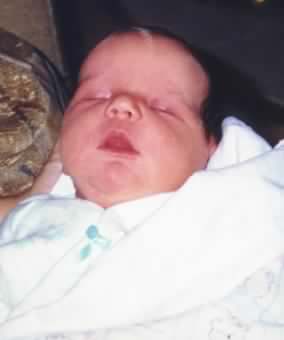

Godly Beginnings for the Family
Paul and Linda J. Bucknell
Godly Beginnings for the Family Index
Starting Families Right | Family Commitment | Family Planning | Husband & Wife Roles | Family Health Plan | Preparations for Childbirth | Tender Newborn Care | Challenge of Child Training | Disciplining & Training Small Children | Setting up Godly Routines
Preparations for Childbirth
Purpose
Preparations for Childbirth include discussions on spiritual preparations in light of miscarriage or deformity, place of childbirth and numerous questions and answers such as Cesarean section, anesthesia, monitoring, birth positions, episiotomies and even nausea. This is part #4 for the Godly Beginnings for the Family series.
Learning how to care for infants, before, during and after birth!
 Making special preparations for your baby is one of the most thrilling experiences in life. We love to see the proud joy of parents cuddling their new little one.
Making special preparations for your baby is one of the most thrilling experiences in life. We love to see the proud joy of parents cuddling their new little one.
The parents-to-be are highly motivated to make everything just right. Many parents, though, looking back find that they were surprisingly rather unprepared for what really happened during childbirth. This lack of preparation comes in part from never having experienced childbirth.
Everything including labor and delivery are totally new to first-time parents. There are, however, a number of interventions because of modern medical techniques that interfere with the natural process God has designed. New parents are largely uninformed about various procedures that take place during the birth process and do not know enough to make wise decisions.
We hope through this session to shed some light on these medical interventions so that with both knowledge and encouragement parents are better able to trust God through this marvelous process. We also want to equip you to make wise decisions.
Godly Beginnings for the Family
Learning how to care for infants, before, during and after birth!
Click to order download (pdf) with study questions, footnotes, etc. or get the powerpoints and handouts.
Click here to view back cover! Smaller | Larger
This is not the last resource on these subjects. We are not doctors. We are the parents of eight children with lots of experiences. We want to bring a God-perspective to the great design of childbirth which is so often left out in the pregnancy books. As you read on, mark areas that you want to gain more understanding.
A) The Joy of Having a Baby
The most obvious fruit of your marriage is seen in your child. God has specially designed the baby to reflect both parents. There are no other special ingredients secretly mixed in from the outside. The DNA of the father and mother combine to make a whole new person. The favorite question asked after the birth is, “Who does he/she look like?” The child is a miracle full of life from God. Every child is made in the image of God and therefore must be rightly protected. God creates the most exciting and beautiful things from unity.

David the Psalmist penned these words in Psalm 139:13-16 under the inspiration of the Holy Spirit. We find wrapped into these few sentences strong assertions about every child.
-
God formed our inward parts.
-
God painstakingly weaves the child together.
-
Each child is ‘fearfully and wonderfully made.’
-
Our persons are planned and our days are ordained for us even before they were.
Surely not one of us is an accident from God’s point of view. Neither should we think of our child as such. We might not have planned for the child, but God sure did!
When first discovering the wife’s conception, the parents are eager to tell everyone. Is this an understatement? Surely not. They have their right and freedom to do so. They should be aware that sometimes there are miscarriages.
Mothers who have had a miscarriage are much more reluctant to share the news of a new pregnancy with others. It is not because they do not want the baby but because of caution and inner preparation in case this child also would have a similar end.
______ Please note footnotes are in purchased copy ______
It is harder for the Mom to handle a miscarriage than the Dad, both physically and emotionally. We know that there are many more miscarriages at the very early stage. We are not even sure if God has even given them life. Any odd bleeding should be reported to the doctor. The wife should also be concerned with any bleeding during any time during pregnancy. Often it doesn’t mean anything is wrong. At other times, the doctor might give special advice. There isn’t much to be done.
Life, death and creation are acts in the hand of God. The more we understand these things, the easier it is to accept a potential miscarriage. We see David’s extreme concern for his baby from Bathsheba. Those around him, having heard that the baby was dead, were afraid to tell him because of what he might do to himself. He had already been fasting and crying out to God.
Interesting, once he discovered the baby was dead, he put on his regular garments and resumed duties as usual. From the Psalms, we see that King David had a tremendous trust in God. This trust was not shaken. His plea was only for grace in the time of deserved judgment.
Parents need to have this same utmost respect for God’s purposes. The baby does after all belong to God. God issued life. True, He created this new human being through the parents, but God still owns the child. The parents are only stewards.
This steward concept will serve the parents well if they can remember it through the years. They will do their best to care for the child through feeding, caring, helping, protecting and training. Most of all they will introduce this child to God and provide a godly upbringing. But a parent only has limited resources. They cannot heal the child. Neither can the doctor. The doctor with all the fancy measures and medicines can only make the body more conducive to health. Antibiotics for example only speed up the recovery.
This is true with every aspect of the child’s needs. The parents want so much for the child to learn more quickly, more accurately and more diligently. Parents often have this not so hidden pride, ‘Oh, he started walking early’ or ‘She already is talking.’ They will soon discover that the child in the end is God’s. God has interwoven all sorts of gifts and desires together and designed a special destiny for each child. Some children live short lives. Some children don’t even hold on to their life past the womb.
It is good and needy, therefore, to acknowledge both God’s part in the life of the child and your part also. This can be done through a simple prayer even before the baby is born. Through our simple but honest words we rightly place our dependence upon God. And indeed if anything discouraging happens, we can trust God in His sovereign will. For because of our sin, we all must die, some earlier than others, but all must die. Here is a sample prayer.
Dear Father in Heaven, we come to dedicate this child you have brought into the world through us. We are glad. We are excited. And yet we want to recognize that you are the Sovereign Creator. This child’s life and all of his or her special needs are in your hands. Please watch over this child. You know our heart’s desire.
We desire for this child to be a godly man or woman that grows up to serve you and bring glory to your Name. Take those desires, dear Lord. We entrust them to you. If you in your sovereign purpose decide to create the child with a disability or giftedness, short days or long, ugliness or beauty, let it be known that we will trust you just the same. This child is yours. We entrust this child to you. Help us watch over this child as you would desire. Keep him or her close to you, O Lord. Forever yours in Christ, the parents.
Through this prayer, we acknowledge and commit ourselves to certain important truths. Most central is that the child is God’s. The Lord has every right to do as He wants with each child. Lastly, we acknowledge that we are His stewards and need His help to watch over this child.
“Can I not, O house of Israel, deal with you as this potter does?” declares the LORD. “Behold, like the clay in the potter’s hand, so are you in My hand, O house of Israel” (Jeremiah 18:6).
B) Baby Preparations
The great thing about birth is that God has taken care of all the details. It might not seem that way with all the doctor appointments and things to read, but it is true. Just think of it, even the ‘nesting’ instinct. Near the end of the pregnancy a burst of energy occurs that helps the mother-to-be make sure everything is ready for the baby. I love to see the whole cycle take place. The wife can rest only when she has everything in place and the needed items in hand.
There is no need to go into what is needed for the birth since wherever you choose to have the child will see to it that you get such a list. Only remember do gather the items by 37-38 weeks so it is not left to the last second! Babies do sometimes comes earlier than expected!
 The baby’s room needs to be clean and protected from cold drafts and bugs as much as possible. Designer furniture is not necessary to raise a happy healthy child. Don’t let the ads fool you or make you feel ashamed if you cannot afford the best furniture in the world.
The baby’s room needs to be clean and protected from cold drafts and bugs as much as possible. Designer furniture is not necessary to raise a happy healthy child. Don’t let the ads fool you or make you feel ashamed if you cannot afford the best furniture in the world.
After all God our Father was willing to have His Son Jesus sleep in a manger (food trough for animals). Not only this, but He let the whole world know about it! How’s that for advertising!
“And this will be a sign for you: you will find a baby wrapped in cloths, and lying in a manger” (Luke 2:12).
Lavish treatment and giving our child everything money can buy will surely lead the child to think that he should be served rather than learning how to serve.
C) Knowledge-Based birth
The involvement of doctors in the birth process is more recent. For many thousands of years women assisted women in giving birth. Some of the modern techniques are in fact unnecessary and hurtful. Some are helpful. Some are critical to saving a baby’s life in certain circumstances.
We wish there was help (now specially termed ‘intervention’) for Rachel when she died in childbirth giving birth to Benjamin. There wasn’t. He would grow up without his Mom. These interventions are for the expectant mother, but all have an effect on the baby.
Modern culture has accepted the ‘medicalization’ of childbirth over the last one hundred years. Even in the early 1900s most children were born at home. Childbirth was ‘natural’. God made it that way. The only thing needed was for someone to catch the baby coming out! This is an overstatement of course. Midwives were quite skilled. They knew all the techniques and took advantage of God’s marvelous birth process.
We wonder whether all the modern interventions really are all that good or even necessary. Are sonograms necessary? Not usually. Is there any harm? We are not sure. To our knowledge there have been no long-term studies that show the safety of sonogram. Is there another way to check on the health of the baby? Midwives use a Doppler that detects the heartbeat. On the other hand, certain high-risk mothers are greatly benefited by a more careful watch provided by sonograms. Eating well and getting plenty of rest and exercise go a long way to making a healthy baby.
The parents are thrilled when at 10 weeks gestation they can hear the heartbeat. Checkups should be just that: making sure nothing is wrong. We can trust God’s wise design of the child birth process. This is true with eating balanced meals, governed weight gain, and proper iron intake. Of course, those with significant health problems and are considered ‘high risk’ and need to take added precautions.
One point of silent tension needs to be mentioned. People are responsible to make wise decisions for themselves, but they often lack the knowledge and expertise on certain matters to make wise decisions. Doctors, however, have this information but on the whole do not take the needed time with their patients to explain these matters. Good doctors are unable to spend the time they would like with their patients due to hospital and financial constraints.
If the world were ideal, doctors would spend more time with the expecting mothers and the parents-to-be would gain the needed knowledge to make wise decisions. But this world is not ideal and to-be parents are often put in fear because they do not have all the needed information for good decisions. Parents will not, however, gain the knowledge and expertise that doctors have.
In the end, we suggest finding a doctor that takes a bit more time explaining things, who has common values with you and is not offended if you consider different choices than he suggests. Doctors are invaluable for their knowledge. We need to choose a doctor and gain wisdom so that we make godly decisions for our lives. Let’s continue by gaining more information on a number of areas of need.
Is there any cure for nausea or morning sickness?
Nausea is a common sign of pregnancy and affects some mothers-to-be more than others. We don’t usually need to tell our older children when Mom is expecting. They know by her nausea and especially her tiredness.
We still haven’t heard of any sure solutions. We probably have heard a million suggestions to resolve the nausea: Eat crackers before getting up in the morning, sour plums or ginger may help, don’t get fatigued, etc…. There are probably as many solutions as there are women.
My wife personally accepted that she was going to feel that way for a time and tried to get on with the business of living. One suggestion was to fast. Nausea is the body trying to rid itself of toxins. We have heard that fasting with just fresh juice for a couple of days may have some benefit. Check with a doctor.
Linda has suffered a lot of nausea. During the first birth she even needed to quit her job due to the intensity of the nausea while Paul was in university. We had to make life adjustments to Gods’ gift and timing of that precious child. God knows how to make impressions though. We still praise God for the many ways He provided for us financially during that time.
What blood tests and other tests need to be done?
The mother will be expected to have a number of blood tests. Not all are necessary. The government has rules and doctors and midwives have their own preferences. Often the adult can waive them if they are knowledgeable about the test. In most cases, mothers do not have a clue as to what is being given them. Doctors rarely spend much time with them. This is one reason we have so much enjoyed the time to talk during checkups with our midwives.
Midwives believe knowledge is important to right decisions. Doctors in most cases are willing to bypass discussion because they expect the patient to obey rather than learn. This is where the danger comes in. Less intervention is possible only if we gain understanding, increase our understanding by frank discussion and have confidence in what we kn ow.
ow.
This will enable us to hold to our decisions through difficult times. The doctor should honor the parents’ decisions and not just tolerate it. If you sense an unwillingness to discuss or bypass some regular procedure, you might consider changing your doctor. Midwives have been very willing to help the parents make the right choices.
Here is an example of this tension. What do you say when the doctor suggests a test for birth defects to be done? The doctors and nurses can exert quite a bit of pressure at times. They often do not spend the time telling you of the possible dangers of birth defect tests or its possible psychological effects upon your life. Nor do they explain what a parent is to do with the knowledge.
Always ask: “Why is this test necessary?” “What difference will it make?” They operate from a given set of assumptions. They assume that you’d want to know if anything were wrong. Some people would want to abort a child with a defect and try again. If the results of a test will not change your decision, then don’t have the tests done. They are not without risks.
If you have the test and it comes out showing that the child is defective, this gives them even more cause to give you pressure to follow through with an abortion. Unfortunately, too many people including some doctors (not all though) believe there are too many people on this earth and have no moral problem with limiting the earth’s population.
This is the opposite of what a Dad and Mom need. We have heard several real stories about parents who have trusted God with what was expected to be a deformed or plausible defect and things worked out well. This confirms that the birth defect test is not always accurate. Even still, we need to trust God with such defects. If God wants to take the life of our child, then let God do it. We should preserve life.
You as parent are responsible for your decisions. Unfortunately, health insurance has blurred this sense of personal responsibility. When an individual has to pay for each item or procedure, then he will be much more concerned whether each procedure needs to be done and the reason why. Who wants to pay for something really unnecessary. When it is free, people are more open to subject themselves to tests without first questioning them.
We might sound rather negative about doctors. We are trying not to be. It is only that many parents-to-be just do not have any insight into the real problems. There are many very kind and gracious doctors. Find them and use them.
At the initial check-up the doctor should order several blood tests: Blood type, RH factor, red blood cell count, test for gonorrhea, and probably some others. Also expect to have a urinalysis.
At every check up you should have your urine checked for protein and glucose. The doctor or midwife will check on the position of the baby especially in the last trimester. They will check your weight, see if there is excessive swelling, and should inquire about any discomforts or problems you may be having.
Where have all the midwives gone?
Years ago midwives would do virtually all the deliveries. And for a while in ‘modern’ countries, it became popular to have a doctor come to do a home birth. Then the doctor stopped making house calls.
The Moms had to go to the hospital. The hospital was for sick people with diseases. The mothers were and are concerned about giving birth in such sterile unfriendly places such as hospitals with diseases all around. But mothers have been willing to make that change, thinking that it was safer to be in a hospital.
For a while the practice of midwifery was almost stamped out, but in the last couple of decades it has made a come back. Midwives have to work with doctors and hospitals that are favorable or at least tolerable to the work of the midwives. And if a mother-to-be develops a condition outside of the midwives expertise, then she needs to use the hospital. The nice thing is that the midwife still often delivers the baby or at least accompanies the mom even at the hospital.
Fortunately, in most cases there are no problems. Baby after baby get high APGAR scores. The less intervention with anesthesia and monitors the better the outcome. Maybe we should note here again that we are not saying it is wrong or immoral to use anesthesia or monitors. Some situations warrant these interventions. However, we believe God’s natural way works best in most cases.
Trust God with all the pain, discomforts, odd feelings, etc. The birth process in a sense takes over and the mother needs only to work with it. It is often the fear of the unknown that causes fear. Trust God to be your strength and that His design is best. Please do not use meditative techniques on words or things. Concentrate, if you can, on how God is with you bringing new life into this world. Think of Mary, Ruth and other noble women of the Bible or in real life.
When has true labor started?
If someone could find an accurate way to predict a baby’s birth, he would make a million of dollars. How many times has a woman come in with all the signs of soon having the baby, but the labor pains slow down and then stop.
We have had our share of false labor. Through the years we seem to have better understood the signs. But who wants to wait at home during the every 4-5  minute contractions lasting for twenty to sixty seconds for over a half an hour? Then the mother could go into transition and delivery happen very quickly.
minute contractions lasting for twenty to sixty seconds for over a half an hour? Then the mother could go into transition and delivery happen very quickly.
A pelvic exam tells how far the mother has dilated. Sometimes a mother dilates to 3 centimeters then stops. If the water breaks, then she does need to go in. Delivery should be within 24 hours to avoid infection.
We have had several close deliveries! Linda walked in and went straight to the bathroom. Her water broke as soon as she sat on the toilet. Our oldest son was born within 15 minutes of entering the door. With our second child, Paul still remembers the doctor running down the hall in his a t-shirt and shorts, not having any time to properly dress. He had time to catch the baby though. Good thing. The husband was not much use; he was outside the door half laying down and near to fainting!
Linda’s last birth was a planned homebirth. The midwives had no center for a couple years. We chose the birth at home option. All the kids were at home and a few in the birth room. It was a great family experience. But it like the others had the testing element to it.
The midwife was trying to get there in time. Paul was trying to remember the instructions in case the midwife couldn’t make it. Fortunately they had cell phones so they could lead him through step by step if necessary. This didn’t comfort Paul much, though he no longer got faintish near birth.
Thankfully, the midwife was there well before baby Rebekah. Paul was relieved. She brought in a few bags of equipment including an oxygen tank in case of an emergency. Linda chose to squat to give birth. And out came the baby, first the head and then the body with a rush. With towels and cloths the mess wasn’t too bad (this was Paul’s concern). Mom was happy. Gram was delighted. The baby was beautiful. Our family was happy. And Mom could go to sleep in her own bed!
Although we share these stories, usually the timing works out fine. It is nice to have phones and then finally get to the doctor or midwife. The tradeoff is that if it isn’t real labor (that persists and leads to birth), the parents can feel rather awkward going home again. At least you will have another try!
Does a woman always need to be shaved?
For a while part of giving a birth in a hospital meant for a mother to be shaved. This was supposedly done for hygienic reasons. We are glad that there are more options today for mothers in hospitals. It is also nice to see the more friendly maternity wards. Hopefully, midwives will again fully accepted by the medical community and be part of the hospitals.
Do they need anesthesia?
Women do not regularly need anesthesia. In fact anesthetics can make it harder for the mother to push. C-sections sometimes occur because the Mom can’t push. At the same time, the doctor and the hospital get more money out of a cesarean. Anesthetics all pass to the baby very quickly. They can make the baby very sleepy and unable to latch on to nurse. Hospital staff can’t give much support to the Mom to enable her to endure through the whole process. Without this coaching, it is really hard for the Mom, especially the inexperienced Mom.
“Shall I bring to the point of birth, and not give delivery?” says the LORD. “Or shall I who gives delivery shut the womb?” says your God” (Isaiah 66:9).
The labor is intensive but the joy of the baby and certain chemicals released in the body help the Mom endure and quickly forget her labor pains. She needs support and proper positioning. Think of labor as pain with a joyous purpose-a new little life soon to be cradled in your own arms! The visible results of your love and oneness.
Is electronic fetal monitoring (EFM/IFM) necessary?
It is not. It had not been used for thousands of years. There are plenty of other signs that enable the obstetrician or midwife to know if the baby is in distress. In fact monitoring messes up the whole birth process by requiring the mother to lay down on her back (lithotomy).
This monitor might be convenient for an absent physician, but laying down on one's back is not the position to give labor or give birth in! The mother should be up and about as much as possible to allow gravity to expand the diameter of the cervix to ten centimeters so the child can be safely born.
Unfortunately, lying down is the worst thing for a Mom in labor even though it is the most common position in hospitals. She should be walking around as much  as possible. We are not saying the Mom can’t lie down or even take a quick nap if it is at all possible. But to be strapped to a bed by monitoring equipment is the opposite of what is needed.
as possible. We are not saying the Mom can’t lie down or even take a quick nap if it is at all possible. But to be strapped to a bed by monitoring equipment is the opposite of what is needed.
We suggest you discuss this with your obstetrician ahead of time. We need to work with God–gravity’s pull and strong unanesthetized muscles if at all possible. The equipment actually can prolong labor and make it more exhausting. This exhaustion in many cases forces the mothers to give up to the doctor’s recommendation for a cesarean birth. A vaginal birth is much healthier for the Mom and the baby.
The mother has a lot of labor discomfort. She wants a normal birth. She tries. She tries hard. In the end she is forced to believe that she cannot give birth the normal way. We feel so much for these mothers. They do not know how the whole procedure works against them rather than for them. Unfortunately, it is too easy to use intervention when it is not needed.
Please remember that when necessary, anesthesia is okay to use by a skilled professional. There is no need to have guilt feelings. Remember God is pro-life and health. If anesthesia protects life and aids in health, then we need to make the wise decision to use it.
What positions can the Mom be in during birth?
The key is to use what best suits you. The hospital is not happy with you wandering about (though the maternity wards are getting more Mom friendly).
![]()
There are many ways to give birth: laying on side, sitting, semi-sitting, birth stool, squatting, semi-squat, hands and knees, and standing. Let’s take a look at Moses’ birth.
“Then the king of Egypt spoke to the Hebrew midwives, one of whom was named Shiphrah, and the other was named Puah; and he said, “When you are helping the Hebrew women to give birth and see them upon the birthstool, if it is a son, then you shall put him to death; but if it is a daughter, then she shall live.” But the midwives feared God, and did not do as the king of Egypt had commanded them, but let the boys live. So the king of Egypt called for the midwives, and said to them, “Why have you done this thing, and let the boys live?”
"And the midwives said to Pharaoh, “Because the Hebrew women are not as the Egyptian women; for they are vigorous, and they give birth before the midwife can get to them.” So God was good to the midwives, and the people multiplied, and became very mighty. And it came about because the midwives feared God, that He established households for them.” (Exodus 1:15-21)
 We are not trying to say that because the Israelites were born on a birthstool, that this is the biblical method. We are trying to point out that what methods we use should cooperate with God’s built in laws such as gravity. For the mother to squat or sit on a birthstool make a whole lot of sense.
We are not trying to say that because the Israelites were born on a birthstool, that this is the biblical method. We are trying to point out that what methods we use should cooperate with God’s built in laws such as gravity. For the mother to squat or sit on a birthstool make a whole lot of sense.
The baby is coming down the canal rather than across when she is laying down. A birthstool looks more like a half-moon, which gives something for the Mom to sit on as well as allows the baby to freely come out. Here is a description of another birth.
“Now his daughter-in-law, Phinehas’ wife, was pregnant and about to give birth; and when she heard the news that the ark of God was taken and that her father-in-law and her husband had died, she kneeled down and gave birth, for her pains came upon her.” (1 Samuel 4:19).
The problem is that often hospitals greatly limit your options.
Should I feel reluctant to talk to the obstetrician?
Not at all. But probably to gain the most of the conversation, you will need to do some reading on your own. We have had eight babies, the second one overseas in a doctor’s small private hospital. We were so glad that we went to a midwife to deliver the first baby. At that time it was primarily because of costs, not having money for the hospital. Of late it has been because of preference.
The doctor in typical doctor style rushes through the patients (expecting mothers) and have a quick solution for every problem. They write off this or that prescription. But ignorance is the beginning of fears. The mother has hardly any idea what to expect. The hospitals have their own expectations. Doctors only have so much time per patient.
Many of the hospitals have resorted to birth classes for the parents to attend. Again, if you are well read, then you can foresee possible problems and see if your doctor is open to your preferred options.
Are episiotomies necessary?
An episiotomy in most hospitals is regularly given for vaginal births. A cut is made in the perineum so that the baby can come out with more ease. It is said that an episiotomy is easier to stitch than a tear. The fact is that a tear is not usually nearly as big as a cut, and can easily be stitched and heals with less discomfort for the new mom.
Episiotomy and tears can mostly be avoided by a good birth position-squatting, side-lying etc… It is also important to support the perineum as the baby comes out. It is a good comfort measure to have very warm cloths ready to hold on the perineum at crowning. It is important not to push vigorously at the point of crowning.
Why are so many women getting cesarean sections (c-sections)?
 One of our greatest concerns is the high rate of caesareans given to women in America. The rate is still increasing to where now more than one out of four births are C-sections. It is totally unnecessary.
One of our greatest concerns is the high rate of caesareans given to women in America. The rate is still increasing to where now more than one out of four births are C-sections. It is totally unnecessary.
Sometimes a cesarean operation is needed, but we think in a large number of cases that it is due more to bad mechanics. The doctors are used to seeing people on beds lying down. It is convenient for them. They don’t have to bend over. They can look professional.
Breech positioning involves higher risks for the mother and child, regardless of whether the delivery is vaginal or cesarean. Cesareans are being selected more often in these cases to try to improve the outcome in the face of the increased risks. But the consensus group found scientific data in this area generally inadequate to make firm conclusions about desirability of one approach over the other.
Most clinical reviews suggest that the cesarean may involve less risk for the premature breech infant, but this may not be true for term breech babies. Several studies indicate vaginal delivery of the uncomplicated term breech infant is preferable because an elective cesarean birth involves risk significant complications for the mother and little or no decrease in the risk of infant death.
America holds one of the highest rates of caesarean birth. Even the Center of Disease Controls has begun to fight this extraordinary high rate.
Once a cesarean, always a cesarean?
No, not at all. Since doctors are now using a lateral (side to side cut down lower), there is less problem of rupturing the former incision. Many women each year are returning to vaginal births. Though it is sad to say that that rate is dropping.
What is the advantage of using a midwife?
Here are some advantages to seeing a midwife for assistance in birth from my wife’s perspective.
-
They spend lots of time teaching, talking about big and small questions. Women to women.
-
They are interested in the whole family, empathetic and have time.
-
Encourage to work along with natural process: nutrition, birth process, exercise, natural remedies, supportive.
-
Less intervention both for mother and child.
-
Family can be together.
-
Less machine oriented with inherent dangers (eg. Use hands instead of sonogram).
-
Less costly (and often covered by insurance programs).
Summary
God has wonderfully designed the birth process for both humans and animals. He is the specialist. We need to be more careful to heed some basic caution. We are in charge of our health and bodies and must learn things to protect us. On the other hand, we need to be more thankful to such a great God who wonderfully cares for us. He is not only the One who gives life but watches over the whole birth scene.
We have concern over the over-medicalization of the birth process. We are glad, though, that many lives are spared and children are helped because of the available interventions at birth. The return of the midwives is a good sign of some sense of restoration of natural child birth. Materinity wards are much more mother and baby friendly. But each parent needs to be aware so they can make the wise decisions that are necessary.
|
Next => Tender Newborn Care
Care for the mother and child afterbirth is important. Detailed suggestions as well as routines are provided for both Mom and baby.












